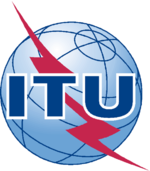International Telecommunication Union
 | |
| Industry: | Internet Governance |
| Founded: | 1865 |
| Headquarters: | Place des Nations 1211 Geneva 20 |
| Country: | Switzerland |
| Facebook: | ITU Facebook |
| LinkedIn: | ITU LinkedIn |
| Twitter: | |
| Key People | |
| Hamadoun Toure, Secretary-General Houlin Zhao, Deputy Secretary-General | |
ITU is the abbreviation for the International Telecommunication Union. It is a leading agency of the United Nations, handling information and communication technology issues. It is also the most important agency for private sectors and governments all across the world in developing networks and services. Headquartered in Geneva, Switzerland, the ITU is dedicated to connecting the entire world through the various means of communications.[1]
History edit
The ITU dates back to the nineteenth century. It was founded in 1865 in Paris as the International Telegraph Union. It took up its current name in 1934, and officially became a part of the United Nations (UN) in 1947. It is one of the oldest international organizations in the UN. Since its establishment, the ITU has facilitated the information and communications industry in many ways, from the invention of the electric telegraph in 1837, to organizing worldwide and regional exhibitions and forums, to bringing together government representatives from all around the world to share their knowledge, ideas and technology for the benefit of the global community, especially the developing world.[1] [2] [3]
Mission edit
Ensuring the growth and sustainable development of the information and telecommunications network is the main mission of ITU. It also supports universal access to technology for all people, so that they are able to participate as well as benefit from the evolving information society and global economy.[4]
Membership edit
The ITU welcomes governments as well as private organizations. Governments may join the ITU as Member States, whereas the organizations can join the ITU as Sector Members.[5] Currently the ITU has 192 Member States and 535 Sector Members,[6] making the ITU a forum wherein governments and private sector players can come together and discuss policy frameworks as well as set agendas that would have substantial impact on the global business in the future.
ITU Sectors edit
The ITU comprises of four sectors: Standardization, Radio Communication, Development, and ITU Telecom. Each of these sectors specializes in policy-related or technical issues in their area of interest. Each sector is led by a director who reports directly to the ITU Deputy Secretary General and the Secretary General.[7]
Standardization: This sector of the ITU is responsible for the production of sophisticated and globally accepted telecommunication standards and related documents that are not under the purview of the ITU Radio-communication Sector.[7]
Radio-communication: This sector is charged with managing satellite resources and international radio-frequency spectrum.[1] It also studies and provides necessary recommendations on issues related to radio communication, ensures effective allocation of radio frequency system bands, works towards eliminating the interference between radio stations of different countries, and enhances the use of geostationary satellite orbit.[7]
Development sector: This sector sees to it that there is equal, affordable, and sustainable access to information and communication technologies (ICTs).
ITU Telecom: This sector works towards bringing together the top names among the ICT industry.[7]
Relation with ICANN edit
In 2005, the ITU signed a MoU with ICANN, which superseded and suspended an earlier MoU which ICANN had with the U.S. Department of Commerce (DOC). The main motive behind signing the MoU with ITU was that ICANN wanted to adopt some practices of ITU's proven practices, such as charging for access to documents and membership in order to make up for publication costs, which would ultimately help to ease budget pressures.[8]